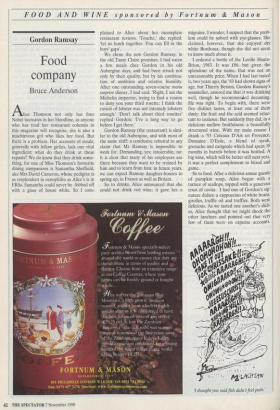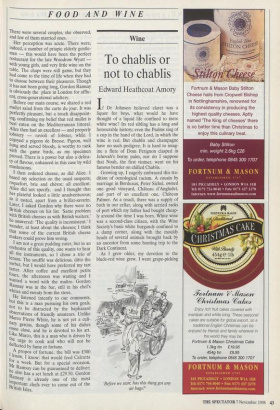FOOD AND WINE sponsored by Fortnum & Mason
Gordon Ramsay
Food company
Bruce Anderson
Aice Thomson not only has four Nobel laureates in her bloodline, as anyone who has read her restaurant columns in this magazine will recognise, she is also a mischievous girl who likes her food. But there is a problem. Her accounts of meals, generally with fellow girlies, lack one vital ingredient: what do they drink at these repasts? We do know that they drink some- thing, for one of Miss Thomson's favourite dining companions is Samantha Sheffield, aka Mrs David Cameron, whose pedigree is as resplendent in oenophiles as Alice's is in FRSs. Samantha could never be fobbed off with a glass of house white. So I corn- plained to Alice about her incomplete restaurant reviews. 'Touché,' she replied: 'let us lunch together. You can fill in the boys' gaps'.
We chose the new Gordon Ramsay, in the old Tante Claire premises. I had eaten a few meals chez Gordon in his old Aubergine days, and had been struck not only by their quality, but by his combina- tion of ambition and relative humility. After one outstanding seven-course menu surprise dinner, I had said: 'Right, I am the Michelin inspector, trying to fmd a reason to deny you your third rosette; I think the ravioli of lobster was not intensely lobstery enough.' Don't talk about third rosettes' replied Gordon: 'I've a long way to go before I get there.'
Gordon Ramsay (the restaurant) is simi- lar to the old Aubergine, and with most of the same staff: a conclusive rebuttal to any claim that Mr Ramsay is impossible to work for. Demanding, yes; intolerable, no: it is clear that many of his employees are there because they want to be trained by him and to learn from him: in future years, we can expect Ramsay daughter-houses to spring up, in France as well as Britain.
So to drinks. Alice announced that she could not drink red wine: it gave her a migraine. I wonder; I suspect that the prob- lem could be solved with eye-glasses. She claimed, however, that she enjoyed dry white Bordeaux, though she did not seem to know much about it.
I ordered a bottle of the Laville Haute- Brion, 1983. It was £86, but given the splendour of the name, that was not an unreasonable price. When I had last tasted it, two years ago, the '83 had shown signs of age, but Thierry Berson, Gordon Ramsay's sommelier, assured me that it was drinking well, though he recommended decanting. He was right. To begin with, there were five distinct tastes, at least one of them dusty: the fruit and the acid seemed reluc- tant to coalesce. But suddenly they did, in a delicious mellow fruitfulness: a beautifully structured wine. With my main course I drank a '93 Coteau( D'Aix en Provence, Domaine D'Eole, a blend of syrah, grenache and carignole which had spent 18 months in barrels before it was bottled. A big wine, which will be better still next year, it was a perfect complement to blood and game. So to food. After a delicious amuse gueule of pumpkin soup, Alice began with a tartare of scallops, topped with a generous crust of caviar. I had one of Gordon's sig- nature dishes: a cappuccino of white beans, girolles, truffle oil and truffles. Both were delicious. As we tasted one another's dish- es, Alice thought that we might shock the other lunchers and pointed out that very few of them were on expense accounts.
'I thought you said fish didn't feel pain.'
FOOD AND WINE
There were several couples, she observed, and few of them married ones.
Her perception was acute. There were, indeed, a number of priapic elderly gentle- men — this would have been the perfect restaurant for the late Woodrow Wyatt — With young girls, and very little wine on the table. The chaps were still game, but they had come to the time of life when they had to choose between their pleasures. Though it has not been going long, Gordon Ramsay is obviously the place in London for afflu- ent, cross-generational adultery. Before our main course, we shared a red mullet salad from the carte du jour. It was Perfectly pleasant, but a touch disappoint- ing, confirming my belief that red mullet is best eaten on the Mediterranean littoral. Alice then had an excellent — and properly lobstery — ravioli of lobster, while I enjoyed a pigeon de Bresse. Pigeon, well hung and served bloody, is worthy to rank with the game birds, as my specimen Proved. There is a power but also a delica- cy of flavour, enhanced in this case by wild mushrooms.
I then ordered cheese, as did Alice. I based my selection on the usual suspects; roquefort, brie and chevre: all excellent. Alice did not specify, and I thought that her plateful looked a little unadventurous; SO it tasted, apart from a brillat-savarm. Later, I asked Gordon why there were no British cheeses on his list. 'Same problem With British cheeses as with British waiters,' he answered: 'The quality is inconsistent.' I wonder, at least about the cheeses; I think that some of the current British cheese Makers could prove him wrong. I am not a great pudding eater, but in an orchestra of this quality, one wants to hear all the instruments, so I chose a trio of lemon. The soufflé was delicious, ditto the sorbet, but I would have preferred my tart tarter. After coffee and excellent petits fours, the afternoon was waning and I wanted a word with the maitre. Gordon Ramsay was in the bar, still in his chef's whites and sweaty from the stove. , Re listened intently to our comments, but this is a man pursuing his own goals, not to be distracted by the haphazard observations of friendly amateurs. Unlike Marco Pierre White, he is not yet a cull- nary genius, though some of his dishes me close, and he is devoted to his art. Like Marco, this is a man who is driven by the urge to cook and who will not be deflected by fame or fortune.
Propos of fortune, the bill was £300 mlow, I know: that would feed Calcutta tor a week. But for a special occasion, , r Ramsay can be guaranteed to deliver; ae also has a set lunch at £29.50. Gordon lanisay is already one of the most Important chefs ever to come out of the 13ritish Isles.



















































































 Previous page
Previous page